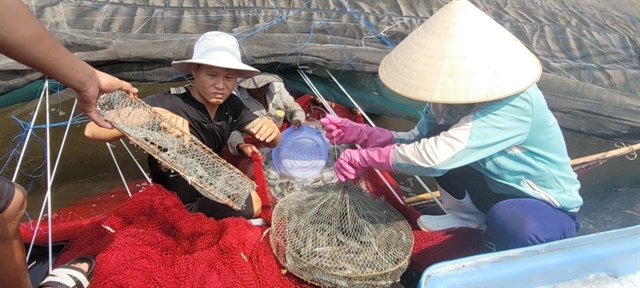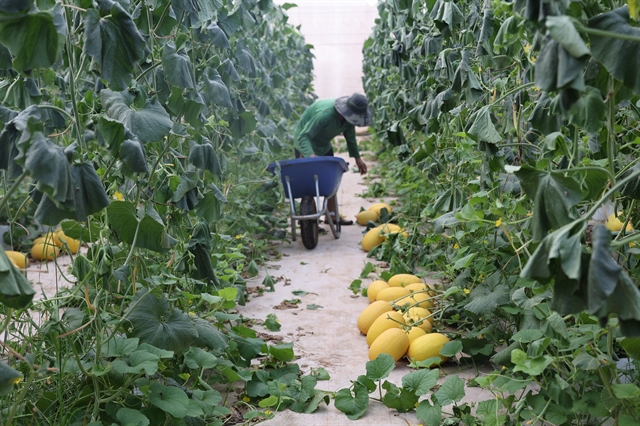 Society
Society

 |
| Harvesting shrimp bred using high-tech farming methods at Chợ Bến Co-operative in Bà Rịa - Vũng Tàu Province’s Long Đất District. — VNA/VNS Photo Hoàng Nhị |
BÀ RỊA - VŨNG TÀU — The southern province of Bà Rịa - Vũng Tàu has developed large-scale, high-value agricultural production that aligns with market demands and enhances the competitiveness of its output.
It has formed several concentrated agricultural zones linked to processing and consumption through value chains.
These include high-tech shrimp farming and pepper cultivation in Xuyên Mộc District, vegetable farming and livestock breeding in Đất Đỏ District and the first high-tech agricultural zone covering 711ha in Châu Đức District.
Local businesses have actively collaborated with co-operatives and farmers to produce key agricultural items such as pepper, rice, cocoa, vegetables, and fruit.
Nearly 16,000ha of crops are cultivated under value chain models alongside large-scale livestock and aquaculture operations.
There are 527 agricultural establishments using advanced techniques, including greenhouses, net houses, water-saving irrigation, hydroponics, aquaponics, temperature sensors, and solar energy.
These modern, large-scale farming and breeding methods have significantly raised the production value of the agricultural sector.
The value topped VNĐ48.7 trillion (US$187 million) last year, up 4.5 per cent from 2023.
The average annual growth rate for agriculture, forestry and fisheries during 2021–25 is projected to be 4.3 per cent.
Nguyễn Công Vinh, Vice Chairman of the province People’s Committee, said: “The province will continue restructuring crop cultivation to suit both market requirements and climate conditions.
“It will concentrate on applying science and technology, promoting demonstration models and developing clean, organic and circular farming. It will also advance the creation of production codes, origin traceability, brand development, and expansion into export markets.”
Rubber, pepper and cashew are among the province’s main industrial crops.
Hồ Văn Thư, who cultivates 1.5ha of pepper organically in Bình Giã Commune, Châu Đức District, said: “In the past excessive use of chemicals in traditional methods caused environmental harm, degraded soil and posed health risks. Switching to organic farming has lowered costs, improved pepper growth and led to higher prices.”
Lâm Ngọc Nhâm, Chairman of the province Pepper Association, said its black pepper has been granted a geographical indication certificate by the National Office of Intellectual Property.
This recognition serves as a strong driver for enhancing the pepper’s position in both domestic and global markets, he said.
Building brands
Bà Rịa–Vũng Tàu is stepping up efforts to build brands for its key agricultural products and promote them to increase both their value and reputation.
It is developing branding strategies for main products such as cashew, pepper, coffee, green-skinned pink-flesh grapefruit, yellow-flesh longan, and banana to meet the standards of local and export markets.
It is also inviting businesses to invest in fruit-growing zones to promote sustainable agriculture and support export growth.
 |
| Honeydew melons are planted in a poly-greenhouse with automatic irrigation and moisture measurement system in Bà Rịa - Vũng Tàu Province’s Long Đất District. — VNA/VNS Photo Hoàng Nhị |
With favourable soil and climate, the province has strongly developed several major fruits, including durian, green-skinned pink-flesh grapefruit, banana, longan, avocado, and dragon fruit.
The total fruit-growing area has risen from 10,300ha in 2019 to more than 15,000ha this year, as many farmers have shifted from less profitable crops to higher-value fruit varieties, according to the province Department of Agriculture and Environment.
In response to increasing export demand, the province has established concentrated growing zones, standardised production practices and granted 59 production codes for 28 farming areas covering over 1,000ha with annual output of around 28,000 tonnes.
In Xuyên Mộc District, two longan areas operated by Thái Lâm Agricultural Materials Production and Trading One-Member Ltd Co and the Nhân Tâm Agricultural and Services Co-operative, spread over more than 40ha in total, have received production codes for export to Japan.
Phan Thế Hoành, director of the latter, said: “Establishing a production code increases a product’s economic value while ensuring quality and transparent origin.”
The province has been assisting businesses and farmers in building value chains and complying with VietGAP and GlobalGAP standards.
It plans to set up seven high-tech agricultural zones between 2025 and 2030.
The goal is for 30 per cent of agricultural goods to be produced under contract farming this year, with the rate increasing to 50 per cent by 2030.
It also aims to attract more investment into high-tech agricultural production, targeting an increase in its share to over 30 per cent of total value by 2030. — VNS




